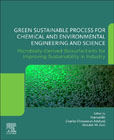
Green Sustainable Process for Chemical and Environmental Engineering and Science: Microbially-Derived Biosurfactants for Improving Sustainability in Industry
Adetunji, Charles Oluwaseun
Inamuddin, Dr.
Asiri, Abdullah M. Ahmed
As awareness and efforts to develop greener products and processes continue to grow in the chemistry community, biosurfactants are garnering much attention for the potential roles they can play, both in reducing the use and production of more toxic products, and as tools for addressing existing problems. Green Sustainable Process for Chemical and Environmental Engineering and Science: Microbially-Derived Biosurfactants for Improving Sustainability in Industry for Improving Sustainability in Industry explores the role biosurfactants could play in providing more sustainable, environmentally benign, and economically efficient solutions for mitigating challenges experienced in the industrial sector. Beginning with an introduction to the production of biosurfactants in Part 1, Part 2 goes on to review their application across a broad range of industry applications, from polymer and biofuel production to lubrification and corrosion protection. Drawing on the knowledge of its expert team of global contributors, Green Sustainable Process for Chemical and Environmental Engineering and Science: Microbially-Derived Biosurfactants for Improving Sustainability in Industry provides useful insight for all those currently or potentially interested in developing or applying biosurfactants in their own work. Highlights effective bioprocessing techniques and factors affecting productionReflects on differing strains of fungi, bacteria, actinomycetes and yeast, and reviews genetic modification of such strains for enhanced biosurfactant productionExplores the use of biosurfactants across a broad range of industrial applications INDICE: Part 1: Production of Biosurfactants for Industry 1. Effective bioprocessing techniques and key factors affecting mass production of biosurfactant using bioreactors 2. Utilization of Agro-industrial wastes for the mass production of biosurfactant 3. Industrially significant microbial strains from fungi, bacteria, actinomycetes and yeast for mass biosurfactant production 4. Strain improvement methodology and genetic engineering for increasing the production of biosurfactant 5. Genetically modified strains and their application in the mass production of biosurfactant 6. Influence of solid state fermentation, submerged fermentation and biphasic fermentation on the production of biosurfactant Part 2: Applications of Biosurfactants in Industry 7. Application of biosurfactants in the production of biopolymers, petroleum and petrochemical products 8. Application of biosurfactants in the refinery of crude oil 9. Utilization of biosurfactants in the production of paints and glossy emulsions 10. Application of biosurfactants in the production of detergents, soaps, personal care products, and natural cosmetics 11. Application of biosurfactants in the production of industrial and institutional cleaners 12. Application of biosurfactant for the production of medicines 13. Significance of biosurfactants in for lubrification, mineral flotation and petroleum recovery 14. Utilization of biosurfactants in the bioremediation of heavy metal and hydrocarbons from industry 15. Application of biosurfactants in the production of anticorrosive agents 16. Application of biosurfactants in the production of biocides for sulfate-reducing bacteria 17. Application of biosurfactants in the food industry 18. Application of biosurfactants in algae cultivation system
- ISBN: 978-0-12-823380-1
- Editorial: Elsevier
- Encuadernacion: Rústica
- Páginas: 370
- Fecha Publicación: 01/02/2021
- Nº Volúmenes: 1
- Idioma: Inglés
